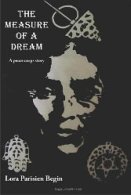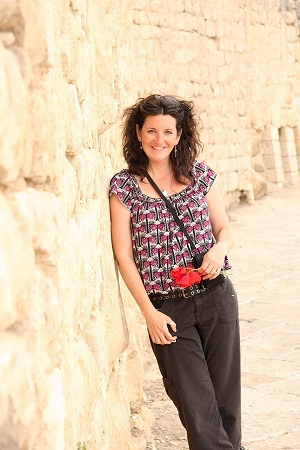Lora Parisien Begin (Tunisia 1989-91) Memoir
 The Measure of a Dream; A Peace Corps Story
The Measure of a Dream; A Peace Corps Story
by Lora Parisien Begin (Tunisia 1988–91)
A Peace Corps Book
$16.96
356 pages
July 2012
Reviewed by Kitty Thuermer (Mali 1977-79)
When I sat down to read Lora Parisien Begin’s charming Peace Corps/Tunisia memoir, The Measure of a Dream, it was all about the misadventures of Bridget Jones in the Casbah — she who tripped her way through the labyrinthian back alleys of Islam — fueled by mint tea and self-deprecating naivite. The soundtrack, of course, was the crackling call to prayer — deafeningly delivered by loudspeaker at 4 a.m.
Yet two days into my read, I was shocked to hear the news that all hell had broken loose in her beloved host country. That Tunisia — famous for igniting the flame of the Arab Spring, yes — was now aflame with a darker anti-American purpose, as evidenced by the carcasses of torched cars littering the US Embassy parking lot and the trashing of the American school — places well familiar to the author.
I can only imagine the sorrow that Lora Begin feels as she weathers the latest news from Tunisia and worries about her Tunisian family, of which she is a proud daughter.
Indeed, that mixed cocktail of emotions reminds me of my own Peace Corps country of Mali, as I — along with generations of Mali Volunteers — mourn the takeover of the entire north by various mysterious Islamic factions.
But back to our Lora. You have to admire her for sweeping aside her yoga mat, kids, and other duties and sitting down to write her memoir about  events that took place more than 20 years ago. What she’s done is divide her story into 62 short chapters — each a vibrant vignette that could be a scene in a play, or from a movie.
events that took place more than 20 years ago. What she’s done is divide her story into 62 short chapters — each a vibrant vignette that could be a scene in a play, or from a movie.
Lora boasts that when she first went to Tunisia in 1989, “I did not know a lick of Arabic or one iota about Arabs or Islam.” Much less how to teach. You’d think she’d be the first one on the plane home. Au contraire! Begin rose to become a stellar Volunteer, a leader, one who then signed on to serve as a Volunteer in Papua New Guinea, worked for Peace Corps in the U.S. for 10 years, and visited her beloved Tunisia six times over the last 20 years.
And during this journey, the Detroit native gently learns — and then teaches through her writing — about Arabs, and Islam, about prejudice and stereotypes, using herself as an example of our collective ignorance as a country.
In an interview with John Coyne in August 2012, she says: “The story takes place over 20 years ago, at a time when the United States first went to war with Iraq. It asks the question: Why, after 20 years, do we still know so little about Arabs and their culture?”
Lora’s own education was forged in the home of her adopted family, the Smadhis, in the town of Beja, where she became daughter number six. “If Islam has a tranquil voice,” she notes, “then Omee (the mother) is it, gently weaving the protective web of faith around her family and me at all times. Islam sustains her, and is the very lifeblood of the family she sustains. In a world gone crazy, where the only Muslim voices that get airtime are the nut-jobs, the overwhelming majority of them pray thusly, in whispers, move thusly, in humility, act thusly, with grace.”
With humor, and raw honesty — Lora Begin weaves stories about daily life in Peace Corps/Tunisia, stories about which many of us can relate: the heartbreak of falling in love with a fellow Volunteer who ignores you in a group and jumps your bones when you’re alone, the joy of visiting friends in the far north, only accessible by a 12 hour bone-crushing bus ride, the agony of learning why your best friend Molly didn’t show up in your town — she was killed instantly by a bus right outside the casbah where you used to live . . . the rollercoaster ride of immersing yourself in your new culture, while trying to maintain the threads of your life back home.
One of my favorite chapters takes place during the holy month of Ramadan, when Lora challenges herself to fast along with her students, an act that opens up their hearts and their homes to her. Why do you fast, she asks? Here are their answers: because it purifies the body and mind, allowing one to draw closer to God, it teaches self control, it promotes kinship with other believers, by experiencing lack, as the poor do, fasting teaches empathy. It is good for the health of the body.
Reading The Measure of a Dream is good for the health of the body, too. Why? Because it turns out that Lora Parisian Begin — who didn’t know a lick about Arabs or teaching — has a pretty good knowledge of both.
•
Kitty Thuermer served in Mali where her back yard was the Mauritanian moonscape. She grew up in India, Ghana, and Germany, worked in Madagascar, Tanzania, and Mali and never met a plane ticket she didn’t like. She is now Director of Publications at the National Association of Independent Schools and lives in Washington, D.C.
No comments yet.
Add your comment